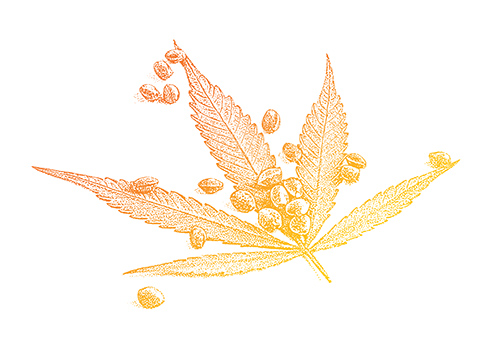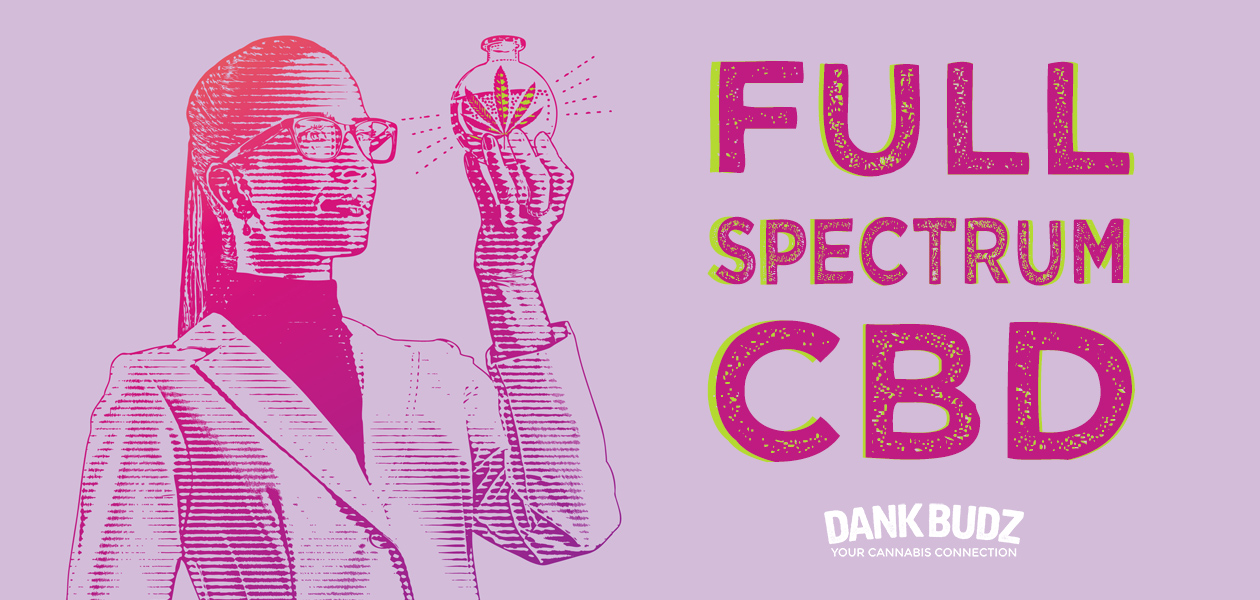
What Is Full Spectrum CBD?
The cannabis market continues to grow with each passing year, thanks to the deregulation of CBD oil and the widespread acceptance of marijuana for both medical and recreational use across states. The latest estimates put the global cannabis market around $13.4 billion, and it is expected to reach $4.4 billion in 2024.
Because of the increase in demand, more manufacturers are working to produce CBD products nationwide. Dank Budz has worked to offer insight from behind the scenes in the marijuana industry. Understanding full spectrum CBD, among other types of cannabis, can help you grow your own product, learn about medical issues surrounding the CBD industry, or become a professional in the industry. Dank Budz can guide you through every aspect of your growth in the business.
In 2018, CBD products were deregulated and legalized nationwide, so long as they are derived from hemp plants. With the rush of new products, however, comes a lot of confusing terminology, especially for those new to using CBD. One particular point of confusion is full-spectrum CBD oil compared to other products like CBD isolate.
CBD Isolate Vs. Full Spectrum CBD
Consumers may notice a few main types of CBD oil, two of the most common being CBD isolate and full spectrum CBD. To understand the difference between the two, it is first essential to understand the chemical makeup of the cannabis plant and how its effects are delivered.
The cannabis plant is comprised of several different compounds, but those of particular interest are cannabinoids. THC and cannabidiol (CBD) are among the two most prevalent and important cannabinoids. Beginning in the 1960s, researchers discovered and isolated THC and CBD oil from the plant, and, in the 1990s, researchers uncovered the endocannabinoid system of the brain, which yielded the discovery that cannabinoids affect the body differently. Specifically, they discovered that THC delivers the psychoactive effect of “getting high,” while CBD does not (in fact, CBD can actually work to counteractive the psychoactive properties of THC).

In addition to THC and CBD, cannabis plants also have other cannabinoids such as Cannabinol (CBN) and Cannabigerol (CBG). Together, all the cannabinoids comprise what we call the “cannabinoid spectrum.”
The Cannabinoid Spectrum and Formulation
In essence, the cannabinoid range in a CBD products determines if it is full-spectrum or CBD isolate. To develop a CBD product, a manufacturer will extract cannabinoids from the plant using a variety of methods, but the most common is CO2 extraction. During the process of extraction, other cannabinoid content may also be extracted, including the terpenes (aromatic compounds), flavonoids, and other cannabinoids such as CBG, CBN, or THC.
Depending on the strain used, a different ratio of cannabinoids will occur. Hemp, or a type of Cannabis Sativa, is the basis for all legal CBD products in the United States. Under the 2018 Farm Bill, manufacturers can produce CBD products from the hemp plant because it contains little to no THC.
Once a company extracts CBD from the plant, it can then refine the product to contain certain cannabinoids or parts of the plant, which determines if a formulation is full spectrum or isolate.
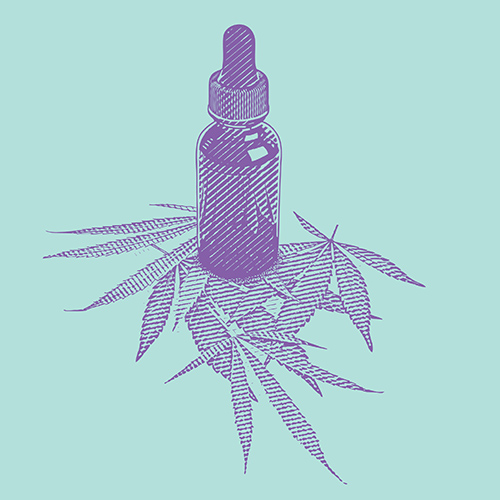
What Is CBD Isolate?
An isolate is, in a scientific sense, the purest part of a compound, which involves extracting the compound singularly from its environment and keeping it separate from all other compounds. As such, CBD isolate is only CBD oil, as it is refined to be free of all terpenes, flavonoids, other cannabinoids, or plant parts.
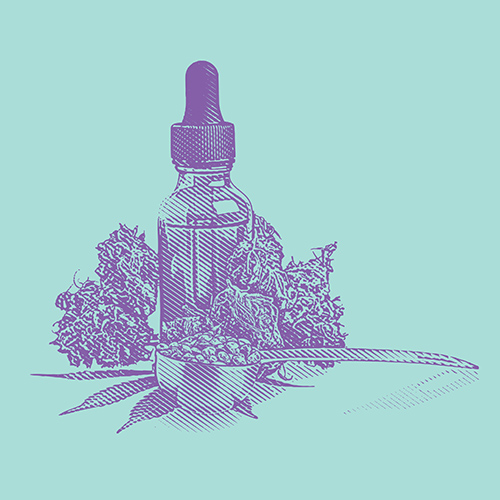
What Is Full Spectrum CBD?
By contrast, full spectrum CBD oil contains all compounds and parts involved in the extraction process, including terpenes, flavonoids, and other plant parts. These parts work together synergistically to create a therapeutic effect.
What Is Broad Spectrum CBD?
There is a third type of CBD oil, called broad spectrum. This is considered a mix of CBD Isolate and Full Spectrum CBD. Like full spectrum, it uses all different parts of plants in the extract, but, like CBD isolate, all THC is removed from the final tincture. As such, broad spectrum CBD has the same synergistic effects of a full spectrum tincture, but without any of the possible psychoactive effects because the THC has been removed.
CBD Isolate Versus Full Spectrum CBD: Which Is Better?
Previously, many people believed that CBD isolate was the most effective form of an isolate. However, a ground-breaking study in 2005 fundamentally changed the way we think about CBD oil.
The study, which came from the Lautenberg Center for General Tumor Immunology in Jerusalem, found that subjects who received full spectrum CBD oil experienced higher levels of symptomatic relief compared to those who received the isolate. In addition, those who received higher doses of full spectrum CBD oil experienced enhanced effects, while CBD isolate effects remain consistent with higher dosing.
A full spectrum CBD oil contains important compounds that may also help explain its healing effects. Examples include fiber, fatty acids, antioxidants, and vitamins.
Which Type of CBD Oil Is Best?
Now that you are familiar with different CBD oil terminology, you might be confused about which formulation works best. Unfortunately, there is no one size fits all answer. Dank Budz offers insight into various data-driven options. If you’re starting to expand into the cannabis industry, you can rely on us to help explain CBD options for your clients.
The body’s response to CBD oil depends on several factors, some of which include:
- Ratio of cannabinoids in the tincture. Some full spectrum CBD oils can have higher levels of THC, which can produce a psychoactive effect. In the United States, CBD oil should legally come from the hemp plant, which has little to no THC. Since it is not federally regulated, however, some manufacturers may produce CBD oil from the Cannabis Indica plant, which has a 1:1 ratio of CBD to THC, on average.
- Personal tolerance to cannabinoids. A couple of different things that contribute to your tolerance to cannabinoids – your previous experience and your chemical makeup. Each of us has a unique endocannabinoid system, which determines the effect that cannabis will have on our bodies and perception to the experience.

In general, CBD isolates are the most potent and purest forms of CBD. It is not uncommon for a CBD isolate to be 90% cannabidiol. In addition, CBD isolates carry no risk of psychoactive effects, since the THC is completely removed. CBD isolate also has the advantage of being odorless and tasteless, which can be a good fit for those who want to cook with it or simply don’t like the taste.
The prime disadvantage of CBD oil, on the other hand, is that you miss out on the synergistic effect of all elements of the plant working together and enhancing the effect of cannabidiol (this is called the entourage effect).
The biggest advantage of using a full-spectrum CBD oil is that it provides the entourage effect. In addition to the cannabidiol, you are also getting important vitamins, minerals, fatty acids, and proteins that can deliver health benefits. However, due to the possible THC content, using a full spectrum CBD oil could cause you to fail a drug test. At the same time, choosing a broad spectrum CBD oil or CBD oil derived from high quality hemp plants can help mitigate this risk, as well.
The terpenes and flavonoids in full spectrum CBD tincture can create both a strong aroma and taste profile. Some people find it pleasurable, some don’t. In this case, CBD isolate versus full spectrum CBD become a matter of personal preference.
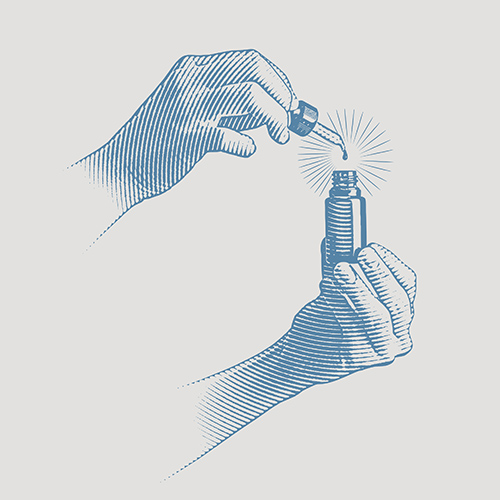
What Is CBD Isolate Good For?
In summary, a CBD isolate formulation may be best suited for individuals:
- Who do not like the taste of full spectrum varieties
- Who are sensitive to THC or other cannabinoid products
- Who live in states with stricter laws regulating products that contain THC
- Who undergo routine drug testing as a condition of continued employment
- Who like to cook with CBD
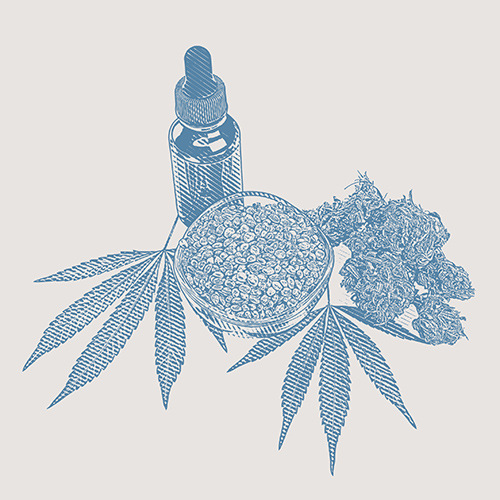
What Is Full Spectrum CBD Good For?
At the same time, full spectrum extract CBD may be best suited for those:
- Who are looking to gain a specific benefit from CBD oil
- Who live in states where are marijuana products have been deregulated or legalized
- Who want to experience extra benefits from all parts of the plant
There is not necessarily one “better” formulation than the other. Some people simply prefer the CBD isolate over full spectrum varieties, for the reasons listed above. At the same time, full spectrum CBD oils can be preferable to some people for the additional benefits they can deliver. When using CBD level, especially when starting out, personal comfort is essential to making the most out of the benefits.
What Else Is In Full-Spectrum CBD?
Full spectrum CBD creates an entourage effect because of the extra compounds it contains, in addition to cannabidiol. Many of these compounds also deliver therapeutic benefits. When checking lab labels (the highest quality CBD oils will have a lab certificate detailing its formulation), you may see some of the following compounds:
- Cannabigerol (CBG)
- Cannabinol (CBN)
- Cannabidivarin (CBDV)
- Tetrahydrocannabivarin (THCV)
- Cannabichromene (CBC)
The benefits of full spectrum CBD oil are not limited to cannabinoids, however. High quality full spectrum extracts will also contain beneficial ingredients such as terpenes, vitamins, minerals, fatty acids, and healthy plant proteins. Let’s explore some of these in more detail.

Terpenes
Terpenes are the compounds in full spectrum CBD oils that are responsible for its scent. As such, there are known for their aromatherapeutic effects. Terpenes work synergistically with other cannabinoids to maximize the benefits to the human body. Some of the most common terpenes that may be present in CBD oil include:

- Limonene – Limonene, as the name suggests, gives CBD a citrusy aroma and may help with mood boosting and gastric upset.
- Pinene – Giving off a pine or juniper aroma, pinene may help promote alertness and improve cognition, particularly memory. It can also work as an anti-inflammatory.
- Linalool – Linalool has a distinctive floral aroma, giving off the essence of rose, lavender, or bergamot. It may help calm or sedate and can be helpful to those who experience depression, stress, or insomnia.
- Caryophyllene – Giving off a spicy aroma reminiscent of cloves, caryophyllene may have a mild antibacterial effect and can help relieve pain or insomnia.
- Humulene – Providing an herbaceous aroma reminiscent of crisp hops, humulene is also a mild antibacterial and may work to suppress appetite.
Vitamins and Minerals
Full spectrum CBD formulations contain several essential vitamins and minerals. Some of the most notable include:
- Vitamin A – A powerful antioxidant, vitamin A delivers a wealth of health benefits. Vitamin A is responsible for maintaining healthy vision, healthy immune system function, and may safeguard against certain types of cancers. Specifically, CBD oil is a good source of beta carotene, a form of vitamin A that can decrease the risk of Hodgkin’s lymphoma and cervical cancer.
- Vitamin E – As a fat soluble antioxidant, most people do not get enough Vitamin E. The compound is specifically good for our hair, skin, and nails, as well as combating the free radical damage that results from environmental risk factors (smoking, air pollution, etc).
- B Complex Vitamins – B vitamins can have a direct effect on your metabolism, red blood cell growth, and overall cellular health. This mineral is essential for men reproductive health. It also plays an important role in wound healing, as well as perception of taste and smell.
- Potassium – Potassium plays a vital role in cellular functions throughout the body. As an electrolyte, it is essential for transmitting electric signals across cells, and it can help reduce the risk of stroke, lower blood pressure, and more.
- Iron – Iron is integral to the health of your red blood cells, and vegetarians can be susceptible to iron-deficiency anemia. CBD oil naturally provides plant-based iron that can promote healthy blood cell production and regulation.
- Calcium – The bone health mineral, many people don’t get enough calcium in their diets, particularly if they are sensitive to dairy products. Fortunately, CBD oil is rich in calcium, which can promote proper bone density.
- Phosphorus – As the second most abundant mineral in your body, phosphorus helps filter out waste and helps promote healthy bones and teeth.
Fatty Acids
In addition to vitamins and minerals, full-spectrum CBD oil is a good source of plant-based, healthy fats. Specifically, CBD that is derived from hemp has what is considered an ideal ratio of Omega 6 to Omega 3 fatty acids. A 3:1 ratio mimics the human body’s needs for optimal brain and body function, and this is the ratio of hemp-derived CBD. Since full spectrum CBD is plant-based and sustainable, it provides an eco-friendly source of Omega 3 and 6 fatty acids.
Fatty acids play an integral role in supporting your body’s immune function, and there is even some evidence to suggest that a lack of appropriate ratios of fatty acids can play a role in the development of autoimmune diseases. As such, supplementation with full spectrum CBD oil has been linked to the effective treatment of certain autoimmune conditions such as eczema. In addition, Omega 3 fatty acids can:
- Reduce blood pressure
- Decrease triglycerides
- Raise HDL (good) cholesterol
- Prevent blood clots
- Mitigate risk of damage from atherosclerosis
CBG
CBG, or Cannabigerol, is a non-psychoactive cannabinoid just like CBD. It functions as the parent compound of CBD and THC and is the precursor to three other cannabinoids. Enzymes work on CBG and turn it into one of the other several different compounds. Research on CBG shows that it can help inhibit the growth of disease, specifically the growth of colorectal cancer cells in animal studies.
CBN
Cannabinol, or CBN, is another cannabinoid that has been shown to be effective in pain and anxiety relief as well as stimulating appetite. It may also have a sedative effect and generate a feeling of relaxation in the person taking it. CBN is a non-intoxicating compound found in older cannabis plants that can also be an antibacterial and anti-inflammatory.
CBC
Cannabichromene, or CBC, is believed to work synergistically with other cannabinoids to enhance its effects. On its own, CBC appears to act on another compound in the human body, anandamide, inhibiting its reuptake so it stays longer in the bloodstream. Anandamide has been demonstrated to effectively block breast cancer’s ability to migrate and proliferate blood vessels, the primary route of breast cancer metastasis. As such, CBC has promising potential as part of a breast cancer treatment plan.
Finding High Quality Full Spectrum CBD Oil

Full spectrum CBD oil has myriad health benefits, thanks to the use of the entirety of the hemp plant. At the same time, however, not all full spectrum CBD oils are created equally. Since CBD is still not regulated at a federal level, manufacturers can make as many claims as they want regarding a tincture’s formulation and effectiveness. When searching for the best full spectrum CBD oil, look for the following:
- A lab certificate of analysis. Lab certification will show you exactly what is in a tincture, including THC content. To mitigate any risk of psychoactive effect, look for a formulation that has little to no detectable THC.
- Organic ingredients. The use of pesticides in the production of hemp plants could mitigate some of the health benefits you are looking to achieve.
- A measuring system. CBD oils come in a range of potencies, so you might need to go through some trial and error to find the perfect amount for your needs. A measuring system allows you to control your dose with ease.
Full spectrum CBD oil can deliver a wealth of health benefits, but not all formulations will be equal quality. Always check your labels and do your research before purchasing. If your business is looking to expand into the cannabis industry, Dank Budz can be your research partner throughout the process. Find quality content to inform the public and reduce the cultural stigma around cannabis.

